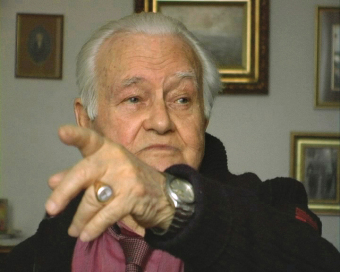Jerzy Kowalewski (*1924)

© Fritz Bauer Institute
“I think human morality is the most important thing – after all, a person should know what moral values he embodies, shouldn’t he?”[1]
Jerzy Kowalewski was born in Warsaw in 1924. His father was the head of a papermill and a printing plant, and his mother worked as a manager in the tobacco industry. Both parents had fought for Poland’s independence in the Home Army (Armia Krajowa) in World War I, and their patriotism and firm Catholic faith also had a decisive influence on their son. Jerzy Kowalewski first went to school in Warsaw and then received his high school diploma from La Châtaigneraie, a boarding school near Geneva, in summer 1939. He returned to Warsaw in August 1939, shortly before the German Wehrmacht invaded Poland, and volunteered for military service because both his parents were at the front. After his country’s defeat, he participated in the underground resistance movement until his arrest by the Gestapo on April 22, 1941.
After countless interrogations and torture sessions, he was deported on April 18, 1942, and two days later he reached the Auschwitz I main camp. There Jerzy Kowalewski had to do heavy labor, building roads as a member of the Buna external detachment during the construction of the I.G. Farben plant. While at work, he tried to make contact with the outside world on behalf of the Polish resistance movement inside the camp. In late May 1942, an SS doctor infected Jerzy Kowalewski with typhus during medical experiments on prisoners, andit was only the assistance of friends and medical orderlies that kept Kowalewski from being gassed. He briefly returned to work on building the Birkenau camp before being transported to the Gross-Rosen concentration camp. There Jerzy Kowalewski had to work first in the quarry and as an electrician, and later as an SS handyman (Kalfaktor). Denounced for illegally listening to the radio, Jerzy Kowalewski was moved to the Dachau concentration camp, where he was finally liberated by the U.S. Army on April 29, 1945.
After his liberation and recovery from the effects of the human experimentation, Jerzy Kowalewski reported again to the Polish army, of which he had formally remained a member throughout the war, and was sent to Langwasser and then to Italy. There, while serving in the army sports company, he happened to run into his father in Rome one day. He studied economic machine operation and industrial economy in Rome and followed his unit to England, where he finally was discharged from military service in 1947. He did not want to stay in Europe and emigrated to Argentina. To be close to his mother, however, Jerzy Kowalewski returned to Poland in the early 1950s despite great difficulties. From then on, as a non-Party member and “second-class human,” he had a hard time earning a living. He worked first for the Argentine Embassy, next in construction, and finally for the state-owned travel agency. He married in 1972, and in 1973 his son, Adam, was born. As a result of the medical experiments conducted on Jerzy Kowalewski by the SS, Adam suffered from polio since birth. From then on, Jerzy Kowalewski served as an advocate for children who were born with a handicap attributable to their parents’ imprisonment in a concentration camp, and he continues that work to the present day.
Jerzy Kowalewski now lives in Warsaw.
(KT/SP; transl. KL)
Jerzy Kowalewski, oral history interview
(Polish, with German subtitles)
















